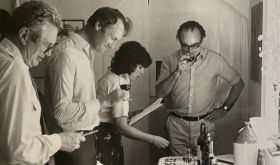The similarities between Ryan Giggs, the magnificent player who pulled on the No 11 shirt for Manchester United on over 900 occasions in a career that spanned the early 1990s to the mid 2010s, and Richard Vines, the recently retired chief food writer for Bloomberg News, Fay Maschler and me may not seem all that obvious. But let me explain.
When Giggs finally hung up his boots, I remember exactly our son’s words which were, ‘we’ll not see his like again’. By this he was referring not to Giggs’s speed down the left wing nor his goal-scoring abilities but rather his loyalty to one club from the time he signed for United in 1987, aged 14 (despite then being a Manchester City supporter) until the time he retired from the pitch in 2014.
It is longevity that is the most obvious link between us four individuals as well as loyalty. Vines has finally retired after 25 years with Bloomberg after an operation for arthritis on one knee and with arthritis also affecting the other. (In our picture, you can’t see the walking stick supporting him.) Maschler finally switched from writing her wonderful weekly column for London’s Evening Standard to writing the less demanding monthly restaurant column for Tatler magazine after 48 years at the Standard, a position she was supposed to occupy for no more than three months after winning a writing competition. And, while I hope that including myself with Vines and Maschler is no hostage to fortune, I have to admit that after 30 years of writing the restaurant column for the Financial Times, my appetite is not quite what it was – a situation not helped by my very recent, third major gut operation.
What also unites the three of us is the relative amateurism of our backgrounds, an omission that we all three of us overcame by our sheer, and obvious, enthusiasm for the role. Maschler’s joie de vivre manifest in her original writing style led the Standard’s management to regard her as a lynchpin of the paper. I secured my job at the FT by sending in, entirely unsolicited, a review to the late JDF Jones, the then editor of the Weekend FT, with a note saying that this was the type of review I would like to read as a subscriber. (I remember two consequences: the first from JDF asking whether I would like to be known professionally as Nicholas or Nick; the second, a more worrying comment from my late mother who recalled the trouble I had had in completing my English essays as a schoolboy!)
Vines joined Bloomberg in 1995 as a markets editor before working his way up to the position of industry team leader when he heard that in 2004 the company was looking for a restaurant critic.
As he explained:
‘I managed to talk my way into the job, writing fortnightly reviews in my spare time, and only made it full time around 2008, when I was named chief food critic.
‘I had no previous experience in the field, and realised that I had to learn a lot very quickly in order to do a good job, so I began inviting out chefs for meals. It is what I have done ever since. Dining out with a talented chef is often like a masterclass in food. And you get all the restaurant gossip too.
‘When I started out, the best restaurants were mainly still French, especially at the top end. Gordon Ramsay led the pack then. The next stage was the democratisation of dining, where Arbutus in Frith Street, Soho, led the way, with a casual and relatively inexpensive approach to serious cooking that opened up restaurants to more people and paved the way for the Polpo/Russell Norman revolution. That was a big change, pushing London dining in the more casual direction of New York. Following on from that whole process, we ended up where we were at the start of the pandemic, with a tremendous diversity of restaurants and (for me) a lack of clear focus. Some chefs had veered off in a depressing Noma-inspired Nordic direction; others were heavily influenced by Asian cooking; and then vegan started making the jump to mainstream. So I suppose the three trends that have been most marked in my time have been the reinterpretation of classical cooking, the democratisation of restaurants themselves, and the diversity of the food that they offer.
‘Three people have left the biggest impression on me. The first is Danny Meyer of New York’s Union Square Café et al. I saw him speak at a Taste of London event and I was knocked out by his original and passionate approach to hospitality. I went up to speak to him afterwards and he has always found time for me since. He continues to be an impressive advocate for restaurants and restaurateurs. The second is Pierre Koffmann, the great chef from Gascony who, happily, has made England his home. We are friends but I am still in awe of his palate and his absolute love of good food.
‘And finally, Maureen Mills. I know it is a bit strange to pick a PR as an inspiration, but Maureen adopted me right at the start of my restaurant-reviewing career, encouraging me, introducing me to chefs and sharing her extensive knowledge of the industry. No one in the business had heard of me or Bloomberg and she opened the doors that I charged through.’
Perhaps this is one other trait which binds us, that we each began in a simpler era when following our own particular instincts was that much easier. Fay Maschler could be both forthright and demure. I, after a decade as a restaurateur, could bring that particular experience to bear. And Richard could charge through doors. And we were each of us learning all the time in an era when not everyone in the entire world was a restaurant expert with an iPhone, an Instagram account and perhaps even a restaurant blog.
I would like to wish Richard the very best of luck. He will be missed.














